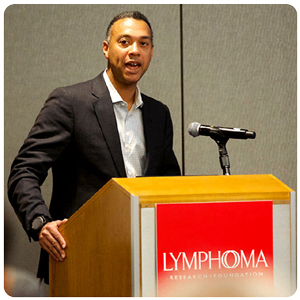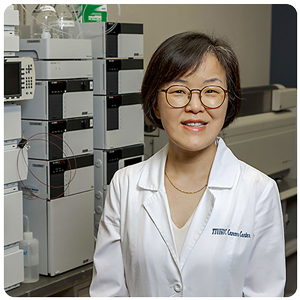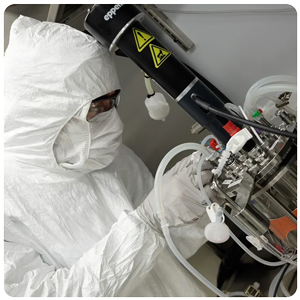
Although racial and ethnic minorities make up approximately 39% of the U.S. population, they comprise less than 16% of clinical trial patients. Latinos, who make up 18% of the U.S. population, represent only 1% of clinical trial patients. This is a serious problem that deprives minority cancer patients of equitable access to new groundbreaking therapies. Underrepresentation of minority patients in clinical trials also compromises the general applicability of trial results, distorts disease-free survival rates and causes erroneous estimates of treatment.
Clinical trial eligibility criteria for cancer research exist to define and protect potential study participants. However, overly restrictive eligibility criteria may inadvertently create populations with different demographic and clinical characteristics than the broader population of oncology patients.
To address this concern, CPRIT has provided grants to programs examining ways to ensure diversity, equity, and inclusion in cancer clinical trials. At the national level, both the Institute of Medicine and the National Cancer Institute have similarly identified increasing diversity in clinical trials as a high-priority area.
With the support of a CPRIT Established Investigator Award (RR190079), The University of Texas MD Anderson Cancer Center recruited Dr. Flowers in 2019 to establish the resources to investigate disparities in the risk, clinical presentation, treatment, and survivorship among lymphoma patients in Texas. Dr. Flowers leads the Lymphoma Integrated Network for Access to Clinical trials for Under-represented Populations (LINCT-UP) to increase minority clinical trial participation in Houston.
Dr. Flowers is also a primary investigator in the Lymphoma Epidemiology of Outcomes (LEO) Cohort, the largest cohort study of lymphoma patients in the country. The LEO study aims to build and maintain a large and diverse cohort of non-Hodgkin lymphoma patients to support a broad research agenda aimed at identifying new clinical, epidemiologic, genetic, tumor, and treatment factors that influence outcome and the overall survivorship experience. The LEO team follows all participants over time to collect updated medical and lifestyle data, quality of life, new treatments, and disease outcomes.

CPRIT investments in core facilities provide Texas cancer researchers access to the state-of-the-art technologies and interventional tools needed for cutting-edge cancer research. Core facility support builds the life sciences infrastructure in Texas while also enabling CPRIT’s impact on cancer research to extend for years beyond the lifetime of the initial awards. To date, CPRIT has awarded $304.44 million in grants to support core facilities across Texas.
CPRIT core facilities across the state have an exponential impact upon cancer research in Texas because the superior scientific resources provided by the core facilities - including specialized instrumentation, databases, tumor libraries, and expertise - is available to the entire research community. Several examples of CPRIT core facilities available to assist researchers developing new cancer-fighting drugs are provided below.
West Texas Pharmacology Core
Texas Tech University Health Sciences Center in Lubbock received a five-year, $3.37 million CPRIT Core Facilities grant in 2022 (RP220631) to create the West Texas Pharmacology Core. Pharmacology is one of the critical components in deciding go-no-go decisions on drug candidates. However, many academic researchers and small biotech companies have limited access to pharmacology services due to the expertise and resources required. This core facility, led by Min Kang, Pharm.D., provides these vital resources to the West Texas research community and furthers the development of new anti-cancer drugs and discoveries in new therapies for childhood cancers.
Advanced Protein Therapeutics Core
In Central Texas, CPRIT awarded Jennifer Maynard, Ph.D., and The University of Texas at Austin a $4 million grant (RP220587) for the Advanced Protein Therapeutics (APT) core facility. Although protein therapeutics are the fastest growing pharmaceutical sector and have helped millions of patients, the activities required to discover, engineer, and produce protein therapeutics require specialized skills and resources that limit most cancer researchers from translating their research into new therapeutics. To address this problem, the APT core facility will make the expertise and a large suite of protein discovery and engineering technologies broadly available to cancer researchers across Texas.
Center for Innovative Drug Discovery
The University of Texas at San Antonio has received two CPRIT Core Facility grants totaling $7.6 million (RP160844, RP210208) to enhance and expand the Center for Innovative Drug Discovery (CIDD). Led by Stanton McHardy, Ph.D., this first-of-its-kind resource of core facilities and capabilities in South Texas integrates two drug discovery facilities at UTSA and UT Health San Antonio that provide researchers in San Antonio and southwest Texas access to pharmaceutical industry level resources and expertise for drug discovery and development. At the time of its second award in 2021, the CIDD had already demonstrated a return on investment through more than $34 million in research grants awarded to investigators using the facility resources, high-level publications, patents and work with CPRIT-funded companies.
Preclinical Development Core for Large Molecule Therapeutics
The discovery and development of large molecule therapeutics, such as monoclonal antibodies and antibody-drug conjugates (ADCs), is rapidly gaining momentum in the state because of CPRIT funding. CPRIT awarded The University of Texas Health Science Center at Houston a $4 million CPRIT Core Facilities grant (RP210119) in 2019 to establish a Preclinical Development Core for Large Molecule Therapeutics. This core facility, led by Qingyun Liu, Ph.D., provides scale-up production, pharmacokinetic analysis, and toxicology studies that assist Texas cancer investigators advancing their large molecular therapeutic leads beyond proof-of-concept. Most current cancer drugs are monoclonal antibodies and ADCs are emerging as a new class of highly effective oncology drugs, so this facility will have a major impact on creating the next generation of cancer drugs for nearly all types of cancer.
North Texas Clinical Pharmacology Cancer Core
In Dallas, the Texas Tech University Health Sciences Center’s North Texas Clinical Pharmacology Cancer Core, led by director William Putnam, Ph.D., has received nearly $8 million since 2012 via three CPRIT Core Facilities grants (RP120495, RP170003 & RP210209). The ultramodern core facility provides deep technical expertise, state-of-the-art instrumentation and equipment, and cutting-edge computer programs. Because of this, North Texas cancer investigators are able to design clinical studies that optimize our understanding of drug distribution in the body, the action of drugs, the best approaches to administer the drug, and enhance cures while reducing unwanted side effects.
Gulf Coast Consortium Combinatorial Drug Discovery Program
Finding new ways to use old drugs to treat cancer is one of the most effective ways to accelerate the discovery of new therapies. The CPRIT-funded Gulf Coast Consortium (GCC) Combinatorial Drug Discovery Program (CDDP), led by Texas A&M University System Health Science Center’s Peter Davies, M.D., Ph.D., is a multi-institutional core facility that provides key resources to support cancer-related drug repurposing and combinatorial drug discovery research. The CDDP is a member of a network of collaborating core facilities, organized by GCC, to promote resource sharing, eliminate wasteful duplication, and provide researchers with the access to the sophisticated technologies necessary to support drug discovery research. The CDDP, which has received more than $10 million in CPRIT Core Facilities grant funding since 2015 (RP150578, RP200668), is a phenomenal resource for cancer-related therapeutics research in the Texas Medical Center (TMC), assisting more than 60 investigators from eight different academic institutions. Projects supported by the CDDP have led to clinical trials and contributed to more than $40,000,000 in new research grant awards to TMC investigators.

RNA Therapeutics Core
RNA is a form of biological software that instructs a cell to make proteins that can protect against cancer; therapeutics exploiting this RNA feature is a promising new class of drugs to defeat cancer. The Methodist Hospital Research Institute’s CPRIT RNA Therapeutics Core in Houston has received nearly $9 million in CPRIT Core Facilities grants (RP150611, RP200619) since 2015 to translate RNA research innovations into cancer therapies. Led by John Cooke, M.D., Ph.D., this core facility provides more than 50 research & development groups with unique services in development, manufacturing, and quality control of RNA therapeutics, as well as animal and human testing. There is no other academic program in the U.S. with comparable RNA capabilities to those offered by this CPRIT core.
Cryo-EM Core
Cryo-electron microscopy (cryo-EM) is a powerful technology that can reveal three-dimensional pictures of cellular machines (protein complexes), with the spatial arrangements of their atoms explaining how they function normally and are defective in cancer. This information is essential to understanding the mechanisms that drive cancer, identifying drug targets, and developing therapeutics. With the support of $9.5 million in two CPRIT Core Facilities grants (RP170644, RP220582), The University of Texas Southwestern Medical Center has built the leading cryo-EM facility in the central United States. Since 2017, the facility, led by Michael Rosen, Ph.D., has generated a huge body of cutting-edge research (70+ publications), trained more than 150 young scientists in cryo-EM, and yielded unprecedented information on protein structure in native environments, revealing molecular and cellular defects in cancer and suggesting new drug targets.
By supporting a wide range of core facility development and renewal, especially in the field of drug development, CPRIT funding is having a positive real-world impact for cancer researchers, institutions, and startup pharmaceutical development companies here in Texas.

Eight out of 10 adults will contract the human papillomavirus (HPV), which puts them at increased risk for six types of cancer. Vaccinating adolescents against HPV before they reach adulthood can help prevent more than 90% of cancers caused by HPV. Unfortunately, according to the most recent available data from the national Healthy People 2030 project, nationwide only 48% of adolescents aged 13-15 received recommended doses of the HPV vaccine. In Texas, less than 16% of 11-13-year-olds attending public schools in medically underserved areas in four communities in Harris and Tarrant counties completed the HPV vaccinations.
In fulfilling our mission to fund innovative cancer prevention programs that focus on evidence-based interventions reaching populations disproportionately affected by cancer risk, incidence or mortality, CPRIT awarded a $1.5 million Prevention grant (PP170046) to The University of Texas Health Science Center at Houston School of Public Health in 2017 to develop the “All For Them” program in one clinic serving Houston ISD middle schools. The pioneering "All For Them" HPV immunization initiative, run in partnership with local school districts, health care provider partners, and other academic and community organizations, ensures that Texas adolescents have access to lifesaving resources and accurate immunization information.
In 2020, CPRIT awarded a second Prevention grant (PP200017) totaling $2 million to expand the successful "All For Them" program’s outreach to middle and high schools in six districts across the state: Aldine ISD, Crowley ISD, Fort Worth ISD, Goose Creek CISD, Houston ISD, and Spring ISD. The "All For Them" program team also created an advisory board, increased staffing to address project needs, launched the second version of the free continuing nursing education course statewide, added team members in Fort Worth through a partnership with the University of North Texas Health Science Center School of Public Health, and created an updated, customized, user-friendly website.
The "All For Them" initiative is responsible for nearly 5,000 children receiving at least one life-saving vaccine, including the cancer-preventing Human Papillomavirus (HPV) vaccine, since the program’s inception.